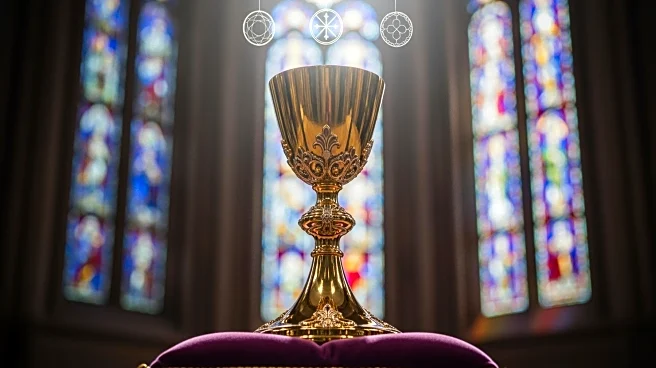What's Happening?
Pope Leo XIV delivered a significant message during a Mass at St. Peter's Basilica, emphasizing the need for unity and service within the Church. He urged that no individual should impose their ideas,
advocating for a collective search for truth. The Mass marked the closing of the Jubilee of Synodal Teams and Participatory Bodies, part of the Church's Jubilee of Hope in 2025. Pope Leo highlighted the importance of transforming tensions between tradition and novelty into harmonious elements through the guidance of the Holy Spirit. He called for a synodal Church that embraces diversity and seeks common discernment, warning against spiritual pride and individualism that can lead to division.
Why It's Important?
Pope Leo's message is crucial as it addresses ongoing tensions within the Church regarding tradition and modernity. His call for unity and service over dominance and individualism could influence the Church's approach to internal conflicts and its relationship with the broader community. By advocating for a synodal Church, Pope Leo is promoting a model that values participation and collective decision-making, which could lead to more inclusive and effective governance within the Church. This approach may also impact how the Church engages with contemporary societal issues, potentially fostering a more open and adaptive institution.
What's Next?
The Pope's message may prompt discussions and actions within the Church to address internal divisions and enhance synodality. Church leaders and members might explore ways to implement Pope Leo's vision of a more inclusive and service-oriented Church. This could involve revisiting governance structures and encouraging broader participation in decision-making processes. The emphasis on unity and service may also influence the Church's external engagements, potentially leading to new initiatives aimed at fostering peace and solidarity in global communities.
Beyond the Headlines
Pope Leo's emphasis on humility and service reflects a broader cultural shift towards more collaborative and less hierarchical structures in various institutions. This approach aligns with contemporary values of inclusivity and shared leadership, which are increasingly relevant in today's interconnected world. The Pope's message may also resonate with younger generations who value authenticity and community, potentially revitalizing engagement with the Church. Additionally, the focus on transforming tensions into harmonious elements could serve as a model for addressing conflicts in other sectors, promoting dialogue and mutual understanding.








